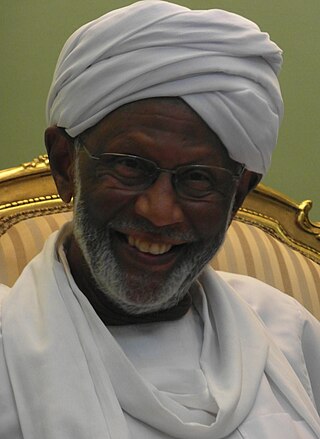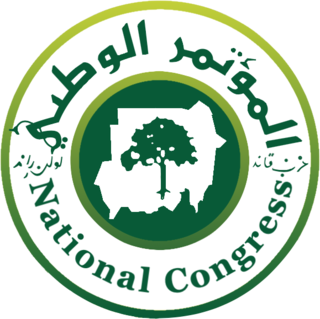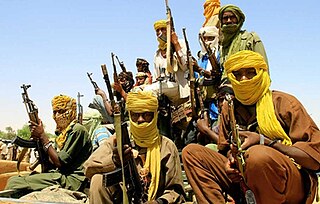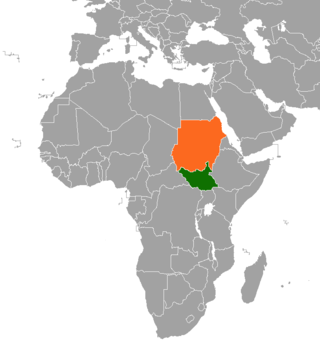| |||||
| Decades: | |||||
|---|---|---|---|---|---|
| See also: | Other events of 2015 History of Sudan | ||||
The following lists events that happened during 2015 in Sudan .
| |||||
| Decades: | |||||
|---|---|---|---|---|---|
| See also: | Other events of 2015 History of Sudan | ||||
The following lists events that happened during 2015 in Sudan .

Currently, the politics of Sudan takes place in the framework of a federal provisional government. Previously, a president was head of state, head of government, and commander-in-chief of the Sudanese Armed Forces in a de jure multi-party system. Legislative power was officially vested in both the government and in the two chambers, the National Assembly (lower) and the Council of States (higher), of the bicameral National Legislature. The judiciary is independent and obtained by the Constitutional Court. However, following a deadly civil war and the still ongoing genocide in Darfur, Sudan was widely recognized as a totalitarian state where all effective political power was held by President Omar al-Bashir and his National Congress Party (NCP). However, al-Bashir and the NCP were ousted in a military coup which occurred on April 11, 2019. The government of Sudan was then led by the Transitional Military Council or TMC. On 20 August 2019, the TMC dissolved giving its authority over to the Sovereignty Council of Sudan, who were planned to govern for 39 months until 2022, in the process of transitioning to democracy. However, the Sovereignty Council and the Sudanese government were dissolved in October 2021.

Omar Hassan Ahmad al-Bashir is a Sudanese former military officer and politician who served as Sudan's head of state under various titles from 1989 until 2019, when he was deposed in a coup d'état. He was subsequently incarcerated, tried and convicted on multiple corruption charges. He came to power in 1989 when, as a brigadier general in the Sudanese Army, he led a group of officers in a military coup that ousted the democratically elected government of prime minister Sadiq al-Mahdi after it began negotiations with rebels in the south; he subsequently replaced President Ahmed al-Mirghani as head of state. He was elected three times as president in elections that have been under scrutiny for electoral fraud. In 1992, al-Bashir founded the National Congress Party, which remained the dominant political party in the country until 2019. In March 2009, al-Bashir became the first sitting head of state to be indicted by the International Criminal Court (ICC), for allegedly directing a campaign of mass killing, rape, and pillage against civilians in Darfur. On 11 February 2020, the Government of Sudan announced that it had agreed to hand over al-Bashir to the ICC for trial.

Hassan al-Turabi was a Sudanese politician and scholar. He was the alleged architect of the 1989 Sudanese military coup that overthrew Sadiq al-Mahdi and installed Omar al-Bashir as president. He has been called "one of the most influential figures in modern Sudanese politics" and a "longtime hard-line ideological leader". He was instrumental in institutionalizing Sharia in the northern part of the country and was frequently imprisoned in Sudan, but these "periods of detention" were "interspersed with periods of high political office".

Sadiq al-Mahdi, also known as Sadiq as-Siddiq, was a Sudanese political and religious figure who was Prime Minister of Sudan from 1966 to 1967 and again from 1986 to 1989. He was head of the National Umma Party and Imam of the Ansar, a Sufi order that pledges allegiance to Muhammad Ahmad (1844–1885), who claimed to be the Mahdi, the messianic saviour of Islam.

The National Congress Party was a major political party of ousted President Omar Al-Bashir, it dominated domestic politics in Sudan from its foundation until it was dissolved following the Sudanese Revolution.

Salva Kiir Mayardit, commonly known as Salva Kiir, is a South Sudanese politician who has been the President of South Sudan since its independence on 9 July 2011. Prior to independence, he was the President of the Government of Southern Sudan, as well as First Vice President of Sudan, from 2005 to 2011. He was named Commander-in-Chief of the Sudan People's Liberation Army (SPLA) in 2005, following the death of John Garang.

Abdel Rahim Mohammed Hussein is a Sudanese politician and the former Governor of Khartoum State. Hussein served as the longstanding Minister of National Defense of The Republic of Sudan. Hussein also served for a period as the Minister of Interior Affairs. During his term as Minister of Interior Affairs, he opened the Rabat University. Hussein was arrested in early April 2019 following a coup on 11 April which overthrew al-Bashir.

This article covers the period of the history of Sudan between 1985 and 2019 when the Sudanese Defense Minister Abdel Rahman Swar al-Dahab seized power from Sudanese President Gaafar Nimeiry in the 1985 Sudanese coup d'état. Not long after, Lieutenant General Omar al-Bashir, backed by an Islamist political party, the National Islamic Front, overthrew the short lived government in a coup in 1989 where he ruled as President until his fall in April 2019. During Bashir's rule, also referred to as Bashirist Sudan, or as they called themselves the al-Ingaz regime, he was re-elected three times while overseeing the independence of South Sudan in 2011. His regime was criticized for human rights abuses, atrocities and genocide in Darfur and allegations of harboring and supporting terrorist groups in the region while being subjected to United Nations sanctions beginning in 1995, resulting in Sudan's isolation as an international pariah.
Ahmed Mohammed Haroun is one of five Sudanese men wanted by the International Criminal Court (ICC) for war crimes and crimes against humanity in Darfur. Despite international pressure on the government of Sudan to surrender him to the ICC, Haroun served as Sudan's Minister of State for Humanitarian Affairs until May 2009, when he was appointed to the governorship of South Kordofan. In September 2007, he was appointed to lead an investigation into human rights violations in Darfur. In July 2013 he resigned as Governor of South Kordofan, and was reappointed by Omar al-Bashir as Governor of North Kordofan. On 1 March 2019, President Omar al-Bashir handed over the running of the country's leading political party, the National Congress, to him. He was arrested in April 2019 by local authorities in Sudan following a coup which overthrew al-Bashir.

General elections were held in Sudan between 11 and 15 April 2010, extended from the original end date of 13 April. The elections were held to elect the President and National Assembly of Sudan, as well as the President and Legislative Assembly of Southern Sudan. The election brought to the end the transitional period which began when the decades-long Second Sudanese Civil War ended in 2005.

The 2011–2013 protests in Sudan began in January 2011 as part of the Arab Spring regional protest movement. Unlike in other Arab countries, popular uprisings in Sudan had succeeded in toppling the government prior to the Arab Spring in 1964 and 1985. Demonstrations in Sudan however were less common throughout the summer of 2011, during which South Sudan seceded from Sudan, but resumed in force later that year and again in June 2012, shortly after the government passed its much criticized austerity plan.

The Sudanese conflict in South Kordofan and Blue Nile was an armed conflict and insurgency in the Sudanese states of South Kordofan and Blue Nile between the Sudanese Armed Forces (SAF) and the Sudan People's Liberation Movement–North (SPLM-N), a northern affiliate of the Sudan People's Liberation Movement (SPLM) in South Sudan. After some years of relative calm following the 2005 agreement which ended the second Sudanese civil war between the Sudanese government and SPLM rebels, fighting broke out again in the lead-up to South Sudan independence on 9 July 2011, starting in South Kordofan on 5 June and spreading to the neighboring Blue Nile state in September. SPLM-N, splitting from newly independent SPLM, took up arms against the inclusion of the two southern states in Sudan with no popular consultation and against the lack of democratic elections. The conflict is intertwined with the War in Darfur, since in November 2011 SPLM-N established a loose alliance with Darfuri rebels, called Sudan Revolutionary Front (SRF).

Bilateral relations between South Sudan and the Sudan were officially started on 9 July 2011 following South Sudan's independence. Sudan became the first country in the world to recognize the independence of South Sudan. However, relations between South Sudan and Sudan have still been poor, with both sides supporting rebel groups in the other's territory.

The Sudan Revolutionary Front, or the Sudanese Revolutionary Front (SRF), is an alliance between Sudanese factions that was created in opposition to the government of President Omar al-Bashir. It was declared on 12 November 2011, following several months of support by Darfuri rebel groups for the Sudan People's Liberation Movement-North in the conflict in South Kordofan and Blue Nile.
A coup d'état was carried out by the Sudanese Armed Forces on 30 June 1989 against the democratically elected government of Prime Minister Sadiq al-Mahdi and President Ahmed al-Mirghani. The coup was led by military officer Omar al-Bashir who took power in its aftermath; he ruled the country for the next 30 years until he was overthrown in 2019.
The Popular Congress Party is an Islamist political party in Sudan. The party was founded by Hassan al-Turabi.
The following lists events that happened during 2011 in Sudan.
The following lists events that happened during 2006 in Sudan.

General elections were held in Sudan on 13–16 April 2015 to elect the President and the National Assembly. They were originally scheduled for 2 April, but were delayed by eleven days. These were the first elections to be held following the secession of South Sudan.

Mohamed Hamdan Dagalo, generally referred to mononymously as Hemedti, is a Sudanese military officer and the current head of the paramilitary Rapid Support Forces (RSF). A Janjaweed leader from the Rizeigat tribe in Darfur, he was the Deputy head of the Transitional Military Council (TMC) following the 2019 Sudanese coup d'état. Since 2013, Hemetti has commanded the RSF. He was considered by The Economist to be the most powerful person in Sudan as of early July 2019.